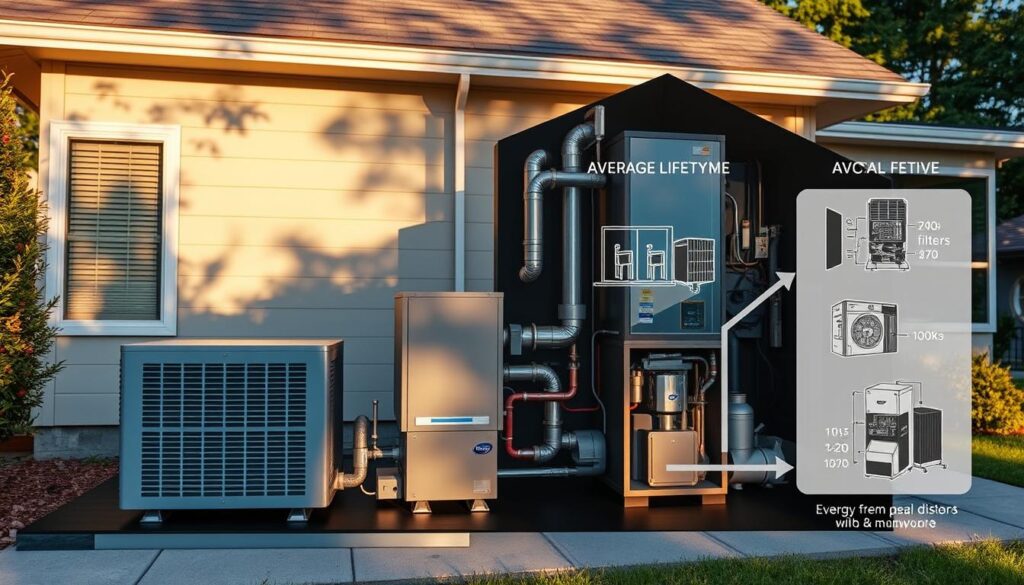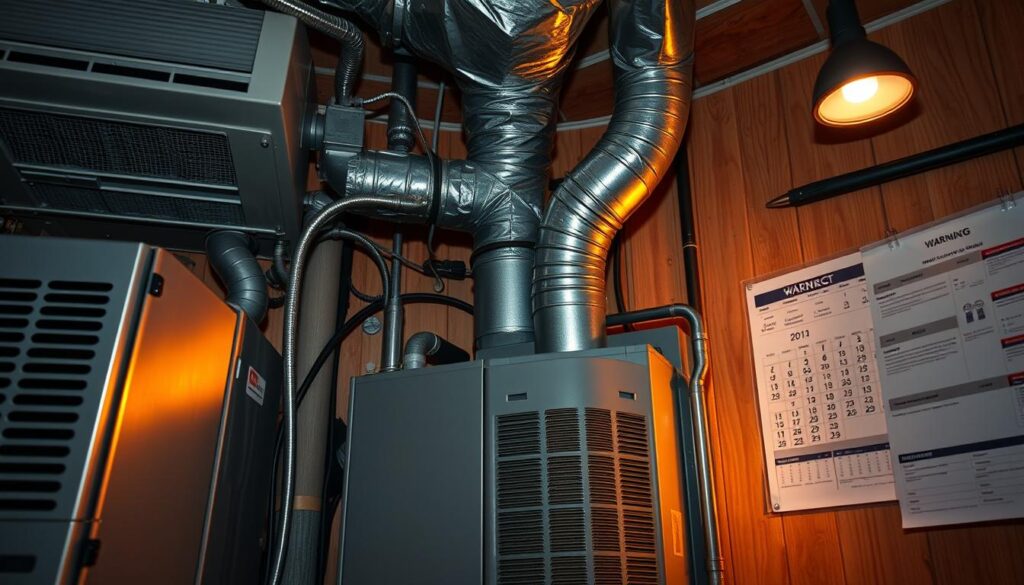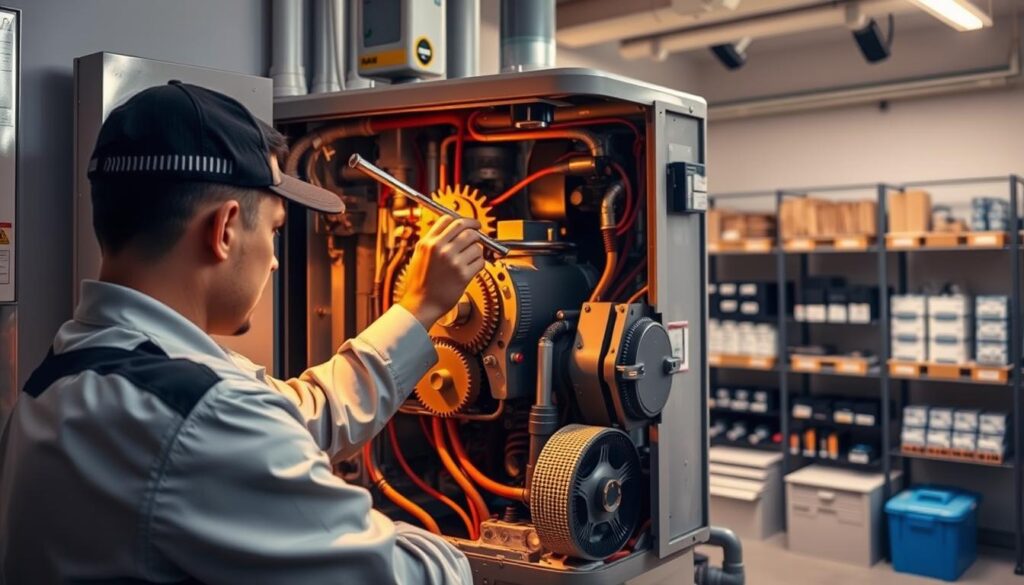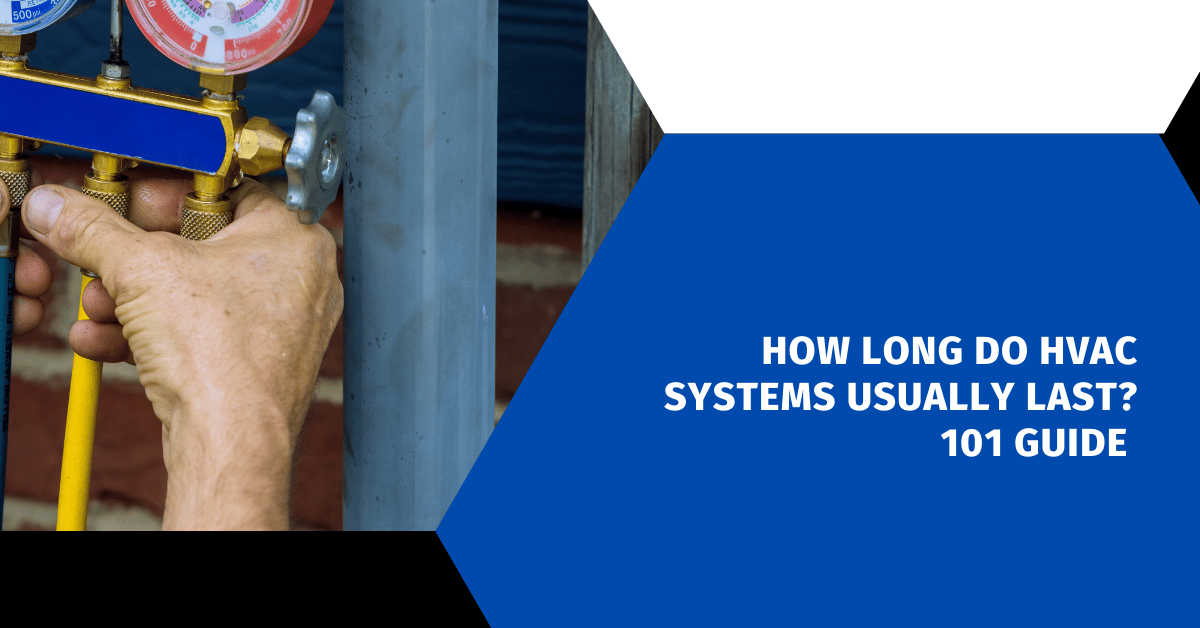Affiliate Disclosure
HVAC Guide Guys is a participant in the Amazon Services LLC Associates Program, an affiliate advertising program designed to provide a means for sites to earn advertising fees by advertising and linking to Amazon.
How Long Do HVAC Systems Usually Last? Ever thought about how long your home’s HVAC system will keep you cozy? Knowing how long HVAC systems last can save you a lot of money. It helps avoid unexpected repair or replacement costs.

The lifespan of an HVAC system usually falls between 15 to 25 years. This isn’t just a guess. It depends on many important things like how well you maintain it, the quality of its installation, and the environment it’s in.
Your HVAC system is a big investment. Knowing how long it lasts helps you plan for future upkeep and possible replacements. Different parts of your system can last different amounts of time. It’s important for homeowners to understand these differences.
Key Takeaways
- Average HVAC system lifespan ranges from 15 to 25 years
- Proper maintenance can significantly extend system longevity
- Different HVAC components have unique lifespan expectations
- Regular inspections can prevent unexpected system failures
- Environmental factors play a critical role in system durability
Table of Contents
Understanding HVAC System Lifespan Basics
Knowing how long your HVAC unit lasts is key to making smart choices for your home’s comfort. Your HVAC system is a big investment. It needs your attention to last as long as possible.
Different HVAC systems last for different times. This depends on many factors. Let’s look at what affects your system’s lifespan.
Types of HVAC Systems and Their Typical Lifespans
- Gas Furnaces: 20-30 years
- Boilers: 20-35 years
- Air Conditioners: 15-20 years
- Heat Pumps: 10-20 years
- Ductless Mini-Splits: 10-30 years
Critical Factors Affecting System Durability
Several key factors affect how long your HVAC system lasts:
- Maintenance Quality: Regular checks by pros can add years to your system’s life
- Installation Precision: A good start means fewer problems later
- Environmental Conditions: Harsh weather can wear out your system faster
- Usage Patterns: Using it right keeps it running well
Average Lifespans by Unit Type
Knowing your HVAC unit’s expected life helps you plan for the future. Most systems last 15-25 years. But, this can change based on how well you take care of it and the weather.
Regular maintenance can add years to your HVAC’s life. This saves you money in the long run.
By taking good care of your HVAC, you can make it last longer. This means your home stays comfortable and energy use stays efficient for many years.
The Expected Lifespan of Common HVAC Components
Knowing how long each part of your HVAC lasts is key to keeping it running well. Each part of your HVAC unit has its own lifespan. This affects how long your system works efficiently.
Important parts are vital for your system’s performance:
- Compressors: Usually last 10-15 years with regular care
- Heat Exchangers: Can last 15-20 years
- Electric Motors: Typically last 10-12 years
How long your HVAC system lasts depends on how well you take care of it. Regular upkeep can make it last longer and work better. Some parts wear out faster and might need to be replaced sooner.
The most important parts for your system’s health are:
- Refrigerant lines
- Electrical connections
- Blower motors
- Condenser coils
Each part faces different stresses based on how much it’s used, the environment, and how often it’s checked. Keeping an eye on these parts can help you spot problems early and replace them when needed.
Pro tip: Annual professional checks can spot wear before big problems happen.
Explore Our HVAC Shop
Looking for top-rated HVAC tools, parts, and accessories? Visit our shop and find the perfect solution for your needs.
Visit the ShopKey Factors That Impact HVAC System Longevity
Your HVAC system’s lifespan is not just about the equipment. Many factors affect how long it will work well in your home. Knowing these can help you plan when to replace or maintain your system.
Environmental and operational conditions greatly impact your HVAC system’s durability. Let’s look at the main factors that decide how long your system will last:
Environmental Conditions
Your local climate is key to your HVAC system’s lifespan. Extreme weather can make it wear out faster:
- Coastal areas with salt air can cause faster corrosion
- Desert regions create additional stress from constant heat
- Humid environments increase moisture-related challenges
Installation Quality
The initial setup of your HVAC system greatly affects its performance and lifespan. Poor installation can cut efficiency by up to 30%. Important things to consider include:
- Proper unit sizing
- Correct ductwork design
- Professional installation techniques
Usage Patterns
How you use your HVAC system affects its lifespan. Regular, moderate use usually makes it last longer than extreme or irregular use. Using it wisely and maintaining it regularly can add years to its life.
Strategic maintenance is your best defense against premature HVAC system failure.
Signs Your HVAC System Is Nearing the End of Its Life

Knowing when your HVAC system is nearing the end can prevent unexpected breakdowns and high repair costs. Most HVAC systems last 10 to 15 years. But, there are key signs that it might be time for a new one.
Look out for these warning signs that your system is struggling:
- Frequent and expensive repairs that are becoming more common
- Significant increases in monthly energy bills
- Uneven heating or cooling throughout your home
- Unusual noises like grinding, squealing, or banging
- Persistent humidity issues inside your living space
When thinking about upgrading, consider your system’s current performance. Many units lose about 50% of their efficiency after 10 years. This means they use more energy, leading to higher costs.
“When repair costs approach 50% of a new system’s price, replacement becomes the most financially prudent choice.” – HVAC Industry Expert
Keep an eye on your utility bills. If they’re going up, even with the same usage, your old HVAC system might be working too hard. It’s using more energy to keep your home comfortable.
The “$5,000 rule” can guide your decision. Multiply your system’s age by the cost of repairs. If it’s over $5,000, getting a new system is likely cheaper.
Explore Our HVAC Shop
Looking for top-rated HVAC tools, parts, and accessories? Visit our shop and find the perfect solution for your needs.
Visit the ShopHow Long Do HVAC Systems Usually Last in Different Climates
Your HVAC system’s lifespan depends a lot on your local climate. Different weather conditions can greatly affect how long your system works well.
Climate is key in figuring out how long your HVAC will last. Some places can make your system wear out faster than others.
Coastal Area Challenges
Homes by the ocean face special HVAC issues. Salt in the air can quickly damage your system. In coastal areas, your HVAC might last 7-12 years, less than in milder climates.
- Salt air speeds up metal damage
- You’ll need to maintain it more often
- You’ll replace parts more often too
Desert Climate Impact
Deserts, like Arizona, are very hot. Summer temperatures can hit 107°F. This makes your HVAC work harder and wear out faster. In these hot places, your system might only last 12-15 years.
- It runs non-stop in the heat
- It uses more energy
- It cycles on and off more
Humid Environment Effects
Places with a lot of humidity also pose challenges. Moist air can lead to mold, lower efficiency, and more strain on your system. This can shorten how long your HVAC lasts by a few years.
- There’s a higher chance of moisture damage
- Mold and mildew can be a problem
- You’ll need to maintain it more
Keeping your HVAC safe from harsh weather can help it last longer and work better.
Essential Maintenance Tips to Extend HVAC Lifespan

Keeping your HVAC system in top shape is key to its long-term efficiency. Your maintenance schedule is essential for extending its life and avoiding expensive repairs.
Here are some important maintenance tips to keep your HVAC system running well:
- Change air filters every 1-3 months to cut energy use by up to 15%
- Book annual professional tune-ups to possibly add 20% to your system’s life
- Clean outdoor units often to keep airflow at its best
- Check and clean condensate drain lines to avoid efficiency drops
Your HVAC’s efficiency over time relies on regular care. Professional inspections are critical for spotting issues early. Try to get a professional to check your system at least once a year.
Here are more maintenance tips to consider:
- Make sure there’s a two-foot space around outdoor units
- Clean evaporator and condenser coils every year
- Check electrical connections regularly
- Use programmable thermostats to boost performance
By sticking to a regular maintenance routine, you can extend your HVAC system’s life. This can also lower your energy bills and keep your home comfortable.
Explore Our HVAC Shop
Looking for top-rated HVAC tools, parts, and accessories? Visit our shop and find the perfect solution for your needs.
Visit the ShopCost Considerations: Repair vs. Replace
Choosing between repairing or replacing your HVAC system is a big decision. The cost of a new HVAC system is a big deal. You need to think about your current system’s state and its future value.
It’s key to understand the money side of your HVAC system. The $5,000 rule is a simple guide to help you decide.
The $5,000 Rule: A Financial Guideline
The $5,000 rule is easy to follow. Here’s how it works:
- Multiply the repair cost by the system’s age
- If the result is over $5,000, it’s best to replace it
- Think about the system’s value and how efficient it is
Investment Return Analysis
| System Age | Remaining Value | Repair Recommendation |
|---|---|---|
| 9 years | $3,500 | Repair likely cost-effective |
| 12 years | $2,336 | Consider replacement |
| 15+ years | $1,172 or less | Strong replacement recommendation |
Thinking about upgrading your HVAC is more than just money. New systems can cut your energy bills by up to 30%. They also offer better temperature control, air quality, and lower maintenance costs.
When you’re looking at replacing, remember these important points:
- How old and efficient your current system is
- How often you’ve had to fix it recently
- The savings on energy
- The boost to your home’s comfort and value
Choosing to replace your HVAC can be a wise choice for your home’s comfort and efficiency in the long run.
Modern HVAC Technologies and Their Durability
HVAC technology has changed a lot in recent years. It now offers homeowners better durability and energy use. New innovations are changing how we think about comfort and saving energy at home.
Today’s HVAC technologies bring big benefits in energy use over time. New features like variable-speed compressors and smart ventilation systems have changed how we control temperature and use energy.
- Ductless mini-split systems offer superior energy efficiency
- Variable-speed compressors adapt to changing load conditions
- Smart ventilation controls optimize airflow and energy consumption
New technologies are making systems last longer and save more energy. For example, heat pumps and geothermal systems can last up to 30-50 years with regular care. This is much longer than older HVAC systems.
| HVAC Technology | Average Lifespan | Energy Efficiency |
|---|---|---|
| Ductless Mini-Split | 15-20 years | High |
| Heat Pump | 10-20 years | Very High |
| Geothermal System | 25-50 years | Extremely High |
When thinking about upgrading, look at these modern technologies. They can make your home more comfortable, use less energy, and last longer.
Explore Our HVAC Shop
Looking for top-rated HVAC tools, parts, and accessories? Visit our shop and find the perfect solution for your needs.
Visit the ShopWhen to Start Planning for HVAC Replacement
Knowing when to replace your HVAC system can save you money and avoid sudden breakdowns. The time to replace depends on several important factors. Homeowners should think about these carefully.
The age of your HVAC unit is key in deciding when to replace it. Most home HVAC systems last between 10 and 25 years. This depends on the type of system and how well it’s maintained.
Warning Signs to Watch
Spotting problems early helps plan your HVAC replacement better. Look out for these signs:
- Increasing energy bills
- Frequent repair needs
- Inconsistent temperature control
- Unusual noises or performance decline
- System is over 15 years old
Timing Your Replacement
Timing your replacement right can save you money and avoid emergencies. Here are some tips:
- Replace during off-peak seasons
- Look into new energy-efficient models
- Set aside money for the new system
- Get professional assessments
Pro tip: Most HVAC experts say replace when repair costs are near 50% of a new unit’s price.
Replacing your system early can stop sudden failures and cut down on energy costs over time.
Conclusion
Knowing how long HVAC systems last is key for homeowners. They want to stay comfortable and protect their investment. With the right care, your HVAC system can last 15 to 20 years.
Regular maintenance is essential for your system’s life. Get annual checks, change filters often, and fix small problems quickly. This helps avoid early breakdowns. Climate, installation quality, and how much you use it also matter.
Different parts of your system last different lengths of time. Gas furnaces can go up to 30 years, but air conditioners usually last 10 to 15 years. Keep an eye on how well your system works. Look out for signs like high energy bills or uneven temperatures.
Being smart about HVAC care saves money and keeps your home cozy. It also makes sure your system works its best for years. Don’t wait for a big problem. Stay ahead of maintenance to keep your home comfortable.

